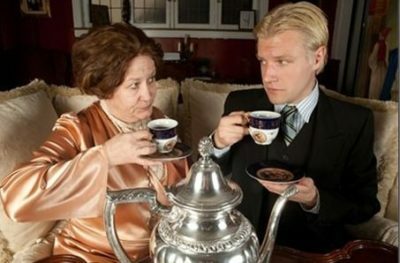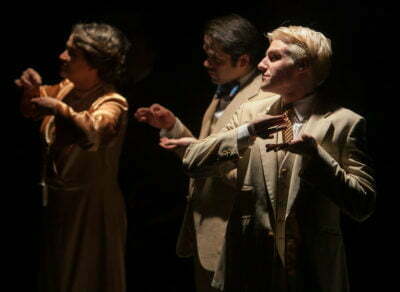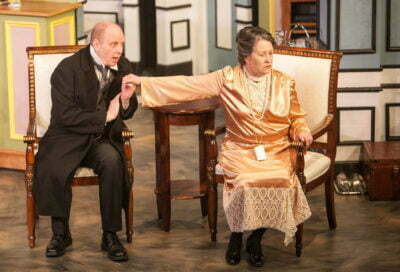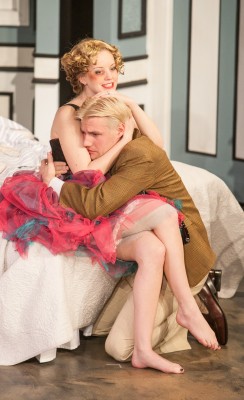Tea with Edie and Fitz

By Adam Pasen
Directed by Jim Schneider
Produced by Dead Writers Theatre Collective
Playing at Greenhouse Theater Center, Chicago
This inchoate new play is in need of a paring down.
In the summer of 1925, the American novelist Edith Wharton sent a letter to F. Scott Fitzgerald, thanking him for the copy he’d sent of his recently published novel, The Great Gatsby, and inviting him and his wife Zelda over for tea. Zelda fortuitously declined, but Fitzgerald went along, perhaps secretly hoping to solicit the blessing of America’s reigning matron of letters. Needless to say, no such blessing occurred. Rather, as the story goes, Fitzgerald got a little drunk and made a crude joke about a couple staying at a Parisian bordello. Wharton, refusing to be shocked, wryly chose to critique Fitzgerald’s narrative technique. The two never spoke again. And despite its becoming anecdotal fodder for decades to come, the meeting appears to have held little personal significance for either party.
 But this somewhat apocryphal encounter nonetheless has come to form the basis for Adam Pasen’s new play, Tea with Edie and Fitz, currently being staged by the Dead Writers Theatre Collective. Strangely enough, however, the exchange itself is almost incidental, serving more or less as a structural fulcrum whereby Pasen can then explore the relative rise and fall of these two authors.
But this somewhat apocryphal encounter nonetheless has come to form the basis for Adam Pasen’s new play, Tea with Edie and Fitz, currently being staged by the Dead Writers Theatre Collective. Strangely enough, however, the exchange itself is almost incidental, serving more or less as a structural fulcrum whereby Pasen can then explore the relative rise and fall of these two authors.
Thus for most of the play, Wharton and Fitzgerald are embroiled in their own separate story lines—Wharton’s insane husband, Fitzgerald’s insane wife, one in their declining years, the other in the bloom of impassioned youth. And to boot, their story lines are written in opposing chronological orders with Wharton’s proceeding forward in narrative time and Fitzgerald’s going in reverse. A considerable thanks is owed to director Jim Schneider for deliberately (and somewhat conspicuously) informing the audience of this unique dramatic structure beforehand, for without prior warning, I doubt I would have even noticed (and honestly, even having known, there were still several moments of confusion). The result, sad to say, is that Edie and Fitz looks a lot like someone trying to ride a bike in two opposite directions (or rather, two bikes being crashed one right into the other).
In brief, Wharton’s emotional arc is muddled by too many needless complications: her spectral best friend, Henry James; her reluctant publisher, Charles Scribner; her insane husband, Teddy (who, weirdly enough, makes a single brief appearance in one scene). What exactly is the story Pasen wishes to tell of her? And Fitzgerald’s storyline about his creative (and sexual) anxieties involving his wife Zelda technically reaches an emotional climax at what is chronologically the beginning of their story. If all this sounds confusing, it is, and with a cast size of twelve when half would have sufficed, the whole production balloons chaotically out of control.
Moreover, in lieu of fully-developed characters Pasen (who has a doctorate in English) affords us instead bibliographical entries—people who do not reveal their inner natures so much as they quote them to us, cross-referencing us back to the titles of novels and short stories beyond the purview of the dramatic moment itself. By consequence, Pasen’s dialogue starts to sound like a series of textual citations—an endless litany of endnotes, footnotes, and parenthetical references—delivered with frequently pain-staking irrelevancy: “How ironic you should bring up fruit,” says Wharton, “since I gave The Fruit of the Tree to Scribner’s.” Ouch.
Pasen is apparently under the impression that in order to write Edith Wharton, his version must first tell us that she is the author of The Age of Innocence or that she is the creator of Lily Bart. Similarly, in order to convey that we are among “literary society,” Pasen has his characters stand up and quote Eliot or make bad jokes about Tolstoy. But only in academia is a writer’s authority derived from the robustness of his bibliography and the breadth of his reference. In the theater, a writer’s authority is based on the shrewdness of his emotional insight, on the nuance of his characterizations, and on the honesty with which he turns life inside out and presents it to us as if for the first time. And on those grounds, Tea with Edie and Fitz sadly underwhelms.
 As a light comedy, however, it manages to deliver the occasional laugh or two. And newcomer Madison Niederhauser’s performance as the titular gin-soaked playboy Fitzgerald manages to retain an effusive charm independent of the script’s errancies. In fact, Pasen seems most comfortable when writing in Fitzgerald’s voice and of all the relationships internal to Edie and Fitz the one between he and his wife Zelda seems to contain the most genuine dramatic momentum (even if Pasen’s portrayal of Zelda seems at time to infantalize her).
As a light comedy, however, it manages to deliver the occasional laugh or two. And newcomer Madison Niederhauser’s performance as the titular gin-soaked playboy Fitzgerald manages to retain an effusive charm independent of the script’s errancies. In fact, Pasen seems most comfortable when writing in Fitzgerald’s voice and of all the relationships internal to Edie and Fitz the one between he and his wife Zelda seems to contain the most genuine dramatic momentum (even if Pasen’s portrayal of Zelda seems at time to infantalize her).
But all in all, Tea with Edie and Fitz needs desperately to learn how to walk before it can run, remembering in the last analysis that no amount of “literary” cleverness can substitute for emotional honesty and depth of character.
SOMEWHAT RECOMMENDED
Reviewed by Anthony J. Mangini
Running time is 2 hours and 30 minutes with one intermission.
Tea With Edie and Fitz runs until June 9th, 2013. The Greenhouse Theater Center is located at 2257 N. Lincoln Ave. For tickets call (773) 404-7336 or www.greenhousetheater.org.
